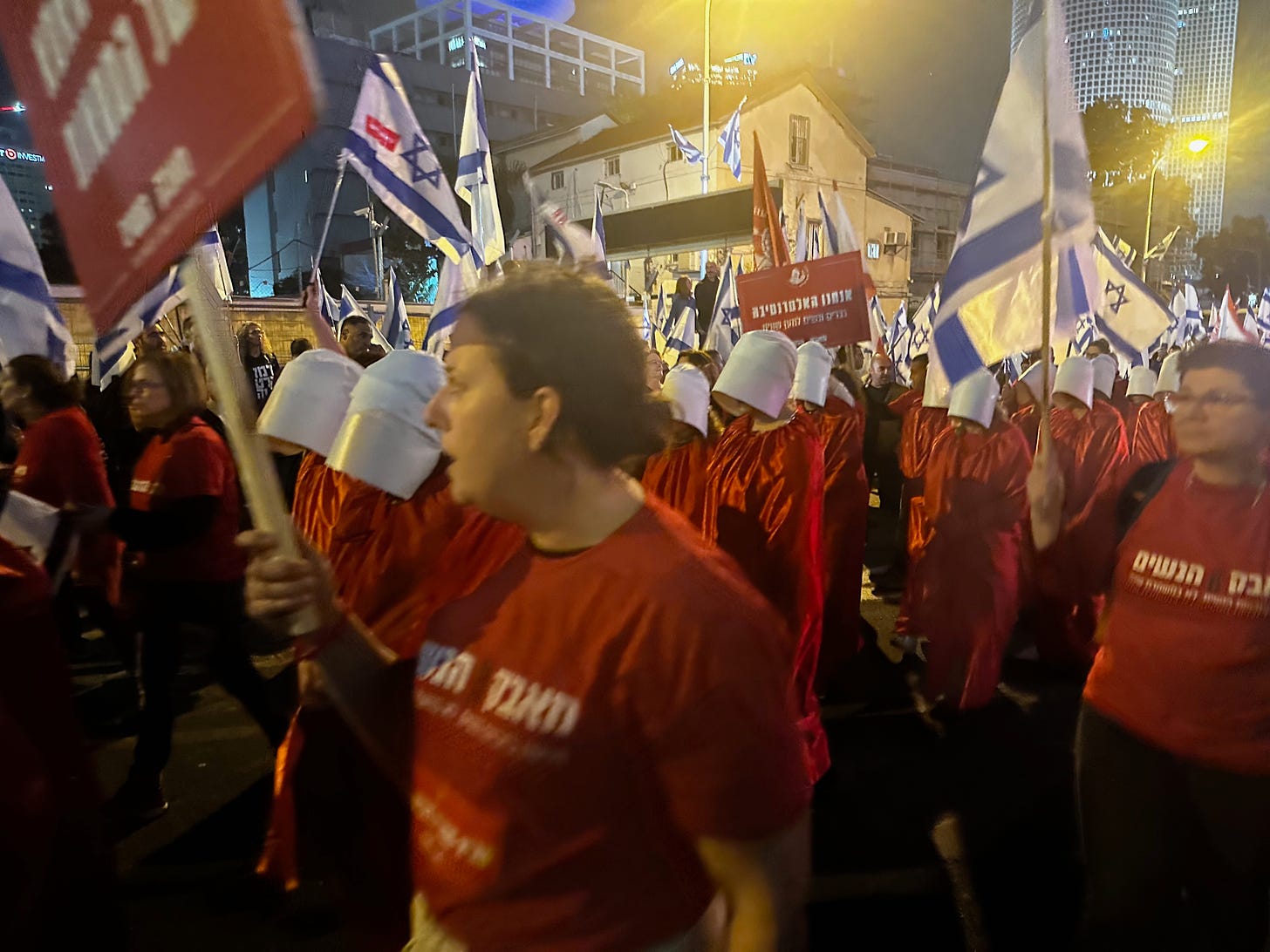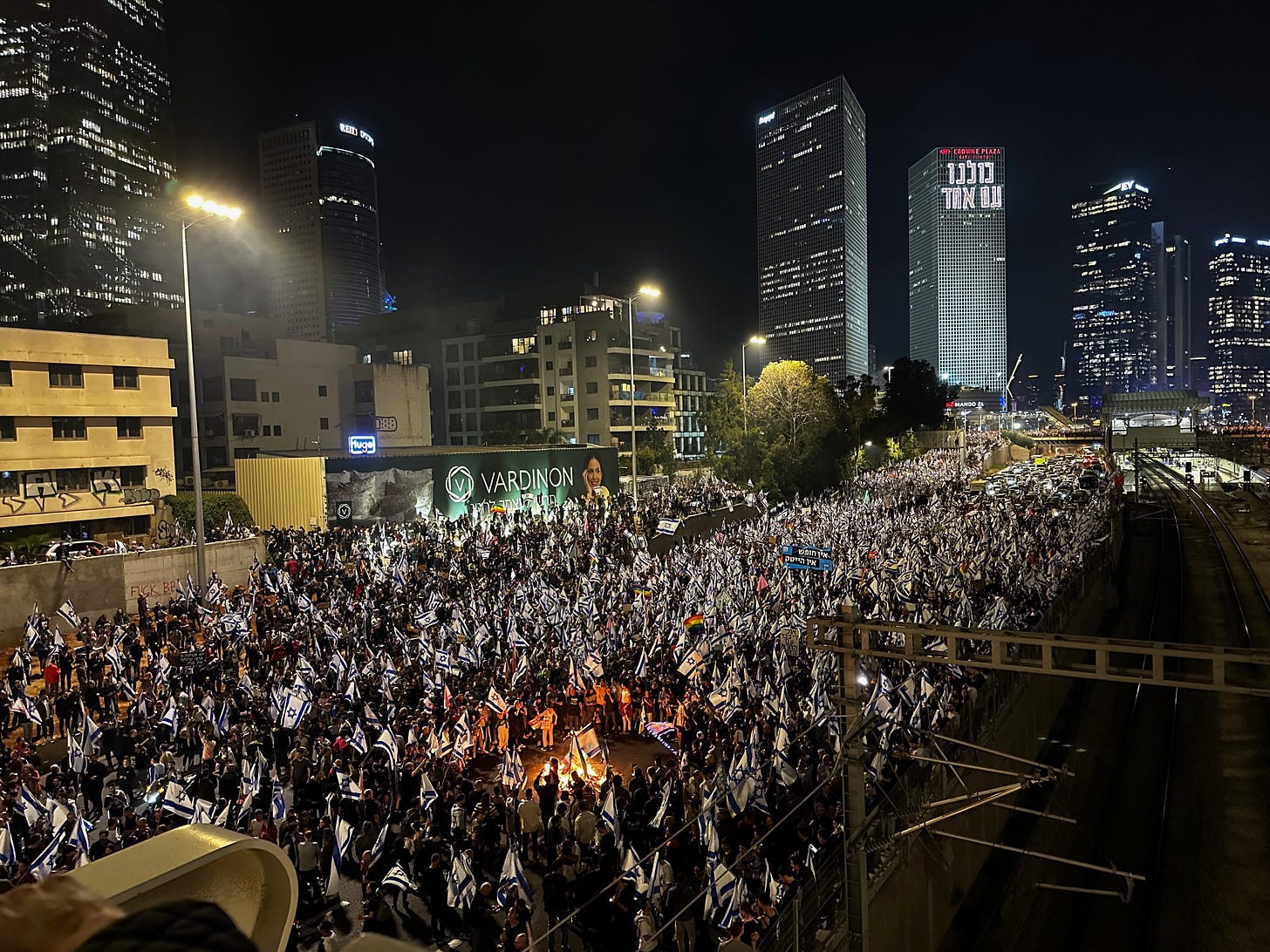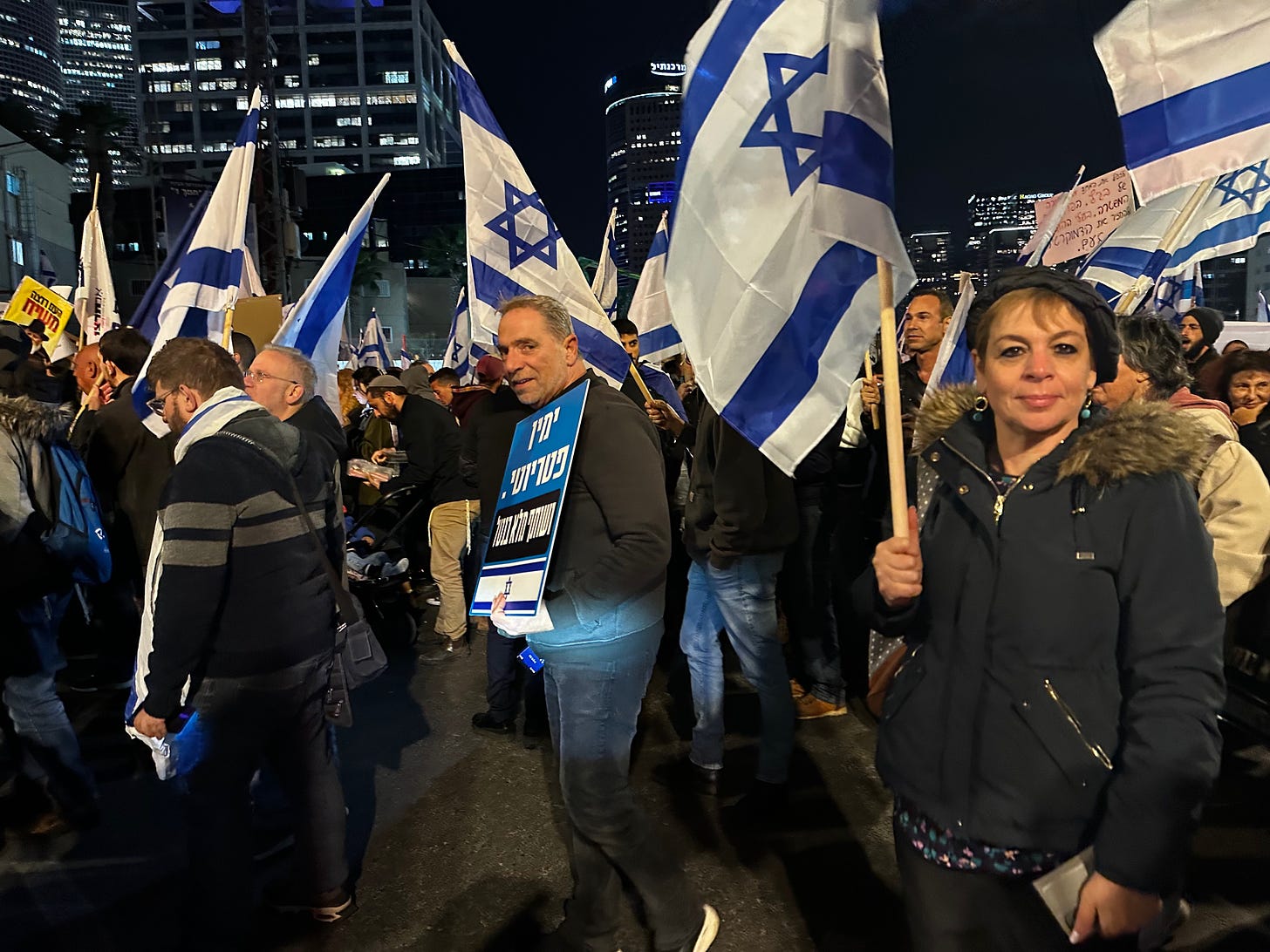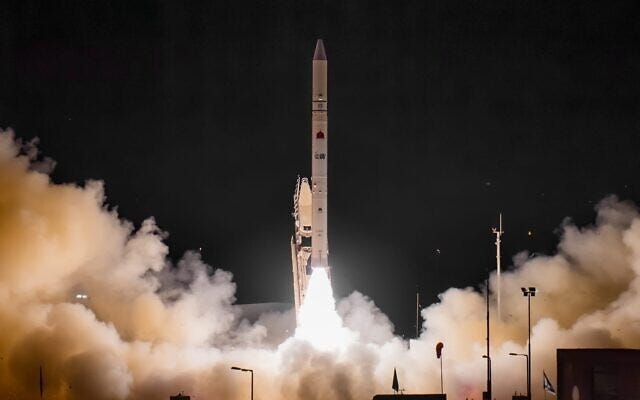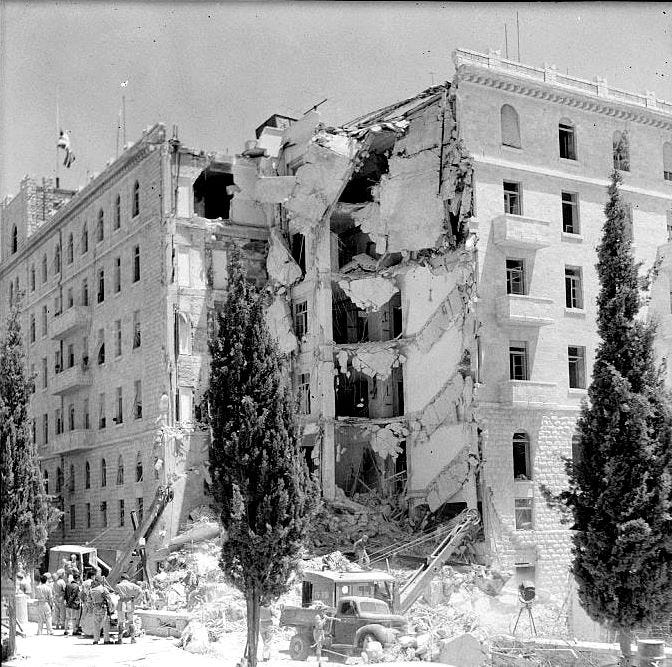Tel Aviv Diary March 31, 2023
Protests Continue, Legislation of Judicial Reform Paused for Negotiations, Economy, History and a Restaurant Review
Happy Passover for those observing. Unless something extraordinary occurs this week, there will be no Tel Aviv Diary next week.
ISRAEL’S INTERNAL STRIFE
This past week has been one of the most intense periods in Israel's history, not involving military conflict, with the final outcomes still uncertain. The turbulent events began on Saturday night, following Prime Minister Netanyahu's widely criticized speech on Thursday evening. In the address, Netanyahu defiantly reaffirmed his commitment to the controversial judicial overhaul plan, and pledged its passage within the week. This speech prompted massive public outcry, with an unprecedented number of protesters taking to the streets on Saturday night
.
An estimated 225,000 people participated in the demonstration in Tel Aviv alone, while an equivalent number gathered at roughly 200 other locations throughout the country. The protests gained further momentum when Defense Minister Galant spoke out on Saturday night, calling for an immediate halt to the judicial overhaul. He warned that the proposed set of laws was adversely affecting Israel's national security.
Prime Minister Netanyahu returned to Israel on Sunday morning from his London trip, discreetly exiting his hotel via a service entrance, to avoid local protesters. Later that evening, at approximately 8 PM, news broke that Netanyahu had fired Defense Minister Galant. Word quickly spread through WhatsApp groups, urging everyone in Tel Aviv to head to Kaplan Street to protest.
For the first time, my wife and our neighbor attended a demonstration together, having previously participated individually. I joined the protest shortly after. At 10 PM, the streets were teeming with people making their way towards Kaplan Street, and then towards the intersection near Azrieli and the Ayalon highway. Tens of thousands of individuals gathered in the middle of the night, nearly all carrying or wearing Israeli flags
.
During previous planned demonstrations, police had prepared by blocking entrances to the Ayalon highway. However, on this night, officers were caught off guard as throngs of protesters surged onto the highway, obstructing the primary route into Tel Aviv. Within moments, tens of thousands of people occupied both sides of the highway, bringing traffic to a standstill. Similar demonstrations took place across the country, with thousands joining for the first time.
Significantly more than 100,000 protesters spontaneous warmed the streets of Tel Aviv, with an additional tens of thousands demonstrating across that night across the country. Many felt that the dismissal of Galant, a well-respected former general and loyal Likud member, had crossed a line. Dismissing Galant for vocalizing the views expressed by the military and warning of a threat to Israel's security, seemed outrageous.
As protests raged nationwide, the head of the Histadrut Labor Federation announced a press conference for the following morning. Speculation mounted that he would finally take a stance and declare some form of national strike. When morning arrived, reports circulated that Prime Minister Netanyahu had decided to halt the judicial overhaul package at the last minute, just before the Knesset was set to pass the first reading. Netanyahu was scheduled to speak at 10:30 AM. However, shortly before 10 AM, it was announced that his speech would be delayed to an unspecified time. In response, the head of the Histadrut Labor Federation declared a nationwide strike across all sectors of the economy — including a partial shutdown of Ben Gurion Airport. This marked the first time both employers and employees had participated in a national demonstration since the British Mandate era.
Throughout the day, protests took place across the country, with the largest gathering of 100,000 people occurring in Jerusalem. That same afternoon, a counter-demonstration in support of the current judicial reform proposal attracted an estimated 20,000 participants. Finally, a little after 8 PM, Netanyahu addressed the nation. He criticized those who refused to report for volunteer reserve duty and violent protesters on both sides (although the only violence had been perpetrated by supporters Netanyahu) before announcing that the legislation would be put on hold until the next Knesset session, after the holidays (i.e. Pesach, Yom HaShoah, Yom Hazikaron and Yom HaAtzmaut). Netanyahu offered to begin negotiations, and while few believe him, all sides agreed to start talks on Tuesday night at the President's Residence. Since then teams have met twice- no reports on progress
.
For all intents and purposes, the Prime Minister could have prevented the nationwide strike, had he addressed the nation and called off the legislation at 10:30 AM, as originally planned. However, it took Netanyahu all day to persuade Ben-Gvir to accept his decision to halt the legislation. Ben-Gvir threatened to leave the government, potentially causing its collapse. Ultimately, Ben Gvir agreed, with the promise that a National Guard under his direct command would be established quickly. The implications of this decision remain unclear.
Opponents of the judicial overhaul have vowed to maintain pressure on the government to abandon the plan, with another demonstration planned for Saturday night, though attendance is expected to be lower.
On Thursday evening supporters of the government demonstrated in Tel Aviv. There were approximately 15,000 people at the demonstration made up overwhelmingly of religious participants. They too, closed Ayalon highway, with small groups blocking other intersections. During the demonstration a journalist from Israel Channel 13 were physically assaulted by protesters.
US—ISRAEL RELATIONS
Meanwhile, there has been a mini-drama in relations with the United States. After the announcement of a delay in the Israeli judicial legislation, US Ambassador Thomas Nides was interviewed on Israeli Radio, where he was asked about Prime Minister Netanyahu being invited to Washington. In response, Ambassador Nides diplomatically stated he believed Netanyahu would eventually be invited. However, Israeli news media immediately reported that an invitation had been extended, prompting the White House to quickly clarify that no such invitation had been made.
In response to the situation, President Biden expressed his concerns during a press conference, stating he is worried about the direction Israel is headed and that he hopes the Prime Minister will work towards a genuine compromise. Biden also made clear that Netanyahu would not receive an invitation to visit the White House anytime soon. These remarks reflect the President's lack of trust in Netanyahu's ability to negotiate in good faith. President Biden's statement has caused shockwaves throughout Israel, with Netanyahu rejecting the notion that a foreign leader could dictate Israel's future, and members of the Likud party launching attacks against Biden.
Recent events in Israel have demonstrated how much the Prime Minister, Benjamin Netanyahu, has been weakened by the events of the past 12 weeks. A proposed law that would have allowed government officials to receive donations toward payment of legal or medical fees was pulled on Wednesday, after being widely criticized as effectively legalizing bribery of public officials. The legislation was seen as an attempt by Netanyahu to receive financial support from his supporters for his legal bills.
It is clear that Netanyahu and his coalition misread the mood of the country, believing they could make significant changes to the system of governance and pass them with ease, due to their control of the Knesset. However, the proposed changes were met with a groundswell of opposition, with people from all walks of life taking to the streets to protest. Protest organizers made a strategic decision to use the Israeli flag as their symbol, making it difficult to attack the demonstrators as being anti-Israeli.
The protests were initially filled with young people, including many who had previously been apolitical. However, as the movement grew, it attracted support from Israel's high-tech community, made up largely of the younger generation. This community, which includes many wealthy entrepreneurs, has been instrumental in funding and supporting the protests, along with members of Israel's elite armed forces.
These groups represent a significant portion of Israel's tax base and provide the country with its qualitative advantage on the battlefield. Their involvement in the protests cannot be ignored, and their influence has been demonstrated by the withdrawal of the proposed law. The message is clear: Netanyahu and his coalition have underestimated the power of a united and determined opposition, and they must take note if they hope to maintain their position in Israeli politics.
ULTRA-ORTHODOX and the PROTESTS
One final point in the analysis of the situation is the shifting stance of the ultra-Orthodox community in Israel. This group had been strong supporters of the judicial reform's override clause, which would have given the Knesset the power to overrule Supreme Court decisions. However, the ultra-Orthodox have now begun to pull back from their support of the most severe changes, realizing that they have become targets of the protests.
The ultra-Orthodox community has traditionally been the recipient of a significant amount of tax dollars, while contributing little to the economy. This has become an issue of concern for the younger generation, who are increasingly aware of the economic realities of the country. As a result, the ultra-Orthodox community has concluded that it is not in their best interest to continue supporting the confrontation over the judicial changes, and they are now taking a more cautious approach. This shift in the stance of the ultra-Orthodox community is a significant development— without them Netanyahu does not have a coalition.
DEFENSE
Israel launched the Ofeq-13 spy satellite from the Palmachim Air Base at 2AM on Wednesday. The satellite uses advanced aperture radar to give all weather images. The launch was done by an Israeli Shavit rocket which flew West as opposed to East, to avoid overflying unfriendly neighboring states. Launching against the spin of the earth is more difficult and limits the payload. The satellite is already sending data.
Israel is reported to have launched two additional raids on Syria this past week including one last night. The Iranians claim that one of the members of the Revolutionary Guards was killed in last nights attack.
HUWARA
Two Residents of settlements in the Northern West Bank were indicted for attacking Palestinians in the town of Huwara with an ax. So far, almost a month later, they are the only ones who have been charged in this heinous act.
CRIME
Rouad Ouiasi, the 25-year-old son of the deputy mayor of Nazareth was killed on Wednesday night. He became the 41st victim of crime in the Arab Israel communities since the beginning of the year.
TEL AVIV MUNICIPALITY
Starting next Sunday the Red Line will begin operations, without passengers. The light rail line will run as if it is operational for 45 days and at the end of the period, if no major mishaps occur, the line will receive its operating license from the Ministry of Transportation.
ECONOMY
The Bank of Israel issued its annual report. Here are some highlights:
The GDP of the country rose by 6.4% in 2022;
Inflation reached 5.3% by the end of 2022;
The Shekel weakened by 4% in 2022 (this before the recent additional decline brought about by the proposed judicial reforms;
The Bank of Israel reported that the income differential between Israeli Jews who are not Charedim between the ages of 20-44 have grown substantially than those who are older. In contrast to the Charedim, the income differential among Israeli Arabs who are younger has dropped.
Of the overall income of Charedi community 21% comes from government sources, while 2% of the income in the Arab Israeli community come from public sources. In the non-Charedi Jewish community, because of the high tax rate, the effect on the community is negative 12%.
BUSINESS
Cisco has purchased the Israeli company Lightspin, which has developed a platform to protect data in the cloud. The purchase price is estimated to be between 200-250 million. Lightspin was established in 2020 and has raised to date $25 million
.
Env0 raised an additional $18.1 million, as an extension to its previous funding-round at the same valuation. The company developed a software platform to automate cloud software operations.
Spera which developed a system to verify identities has raised $10 million in a seed round.
A PIECE OF HISTORY— KING DAVID HOTEL BOMBED
The King David Hotel in Palestine served as the British Military Headquarters during that time. The Irgun, a paramilitary group, successfully smuggled bombs into the hotel. Originally, the bombing was intended to be part of a larger offensive in coordination with the Haganah, another Jewish paramilitary organization. However, under pressure from Chaim Weizmann, the Haganah withdrew its participation.
Irgun operatives managed to bring the bombs into the building, concealing them in milk cans. They placed these explosives in a basement room known as the La Regence Cafe, which was situated beneath the structural beams supporting the southern end of the building.
Controversy persists regarding whether the Irgun provided adequate warning for evacuation of civilians from the hotel. The group claimed they had given sufficient notice, but the British authorities disputed this claim. Chief Secretary Shaw, the British commander, hesitated to evacuate the headquarters due to the bomb threat, believing that an informant within the Irgun would alert him. It is confirmed that the Irgun made three separate warning calls about the impending explosion, but the building was not evacuated.
Consequently, the hotel was fully occupied when the bombs detonated at 12:37 PM. The explosion and subsequent collapse of a portion of the building resulted in the deaths of 91 individuals: 41 Arabs, 28 British citizens, 17 Jews, 2 Armenians, 1 Russian, 1 Greek, and 1 Egyptian. An additional 49 people sustained injuries.
The attack received widespread condemnation, not only from British authorities, but also from mainstream Zionist organizations. Initially, the British government planned extensive retaliation against the Jewish population of Palestine. However, due to ongoing negotiations regarding a joint American-British plan for Palestine, they restrained their response to limited curfews.
A TASTE OF TEL AVIV—BRIX
RESTAURANT REVIEW, by Tali Schulman
In the past 6 months, Tel Aviv has become flooded with new wine bars popping up all over the city. In the coming weeks, you will be hearing about a number of them here, but today we start with Brix. Located in Kikar Givon (the square between Hashmonaim and Haarbaa streets), Brix brings great wine and delicious bites to an area that was previously lacking in really great places to sit for food and drinks. The concept is simple and casual, making it a great place to sit for pretty much any occasion. Ask the staff to help you choose a bottle of wine, and make sure to order some small plates along side. While I enjoyed all the bites, I would specifically recommend ordering the chopped vegetables and the grilled cheese sandwich.
For more Tel Aviv restaurant recommendations, you can find me on Instagram @talischulman where I save all my food adventures in my highlights!




